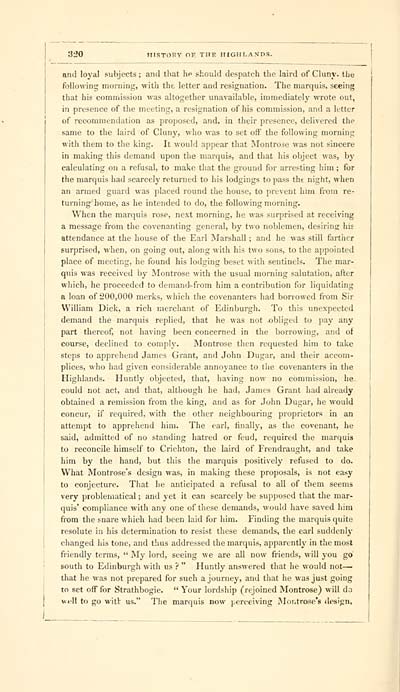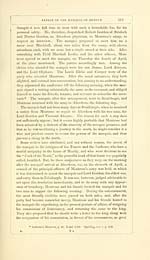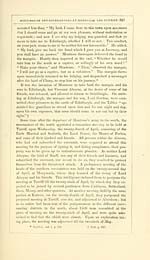Download files
Complete book:
Individual page:
Thumbnail gallery: Grid view | List view

320 HISTORY OF. THE HIGHLANDS.
and loyal subjects ; and that hp should despatch the laird of Cluny. the
follo\vin<; morning, with the letter and resignation. The marquis, seeing
that his commission was altogether unavailable, immediately wrote out,
in presence of the meeting, a resignation of his commission, and a letter
of recommendation as proposed, and, in their presence, delivered the
same to the laird of Cluny, who was to set oft' the following morning
with them to the king. It would appear that Montrose was not sincere
in making this demand upon the marquis, and tliat his object was, by
calculating on a refusal, to make that the ground for arresting him ; for
the marquis had scarcely returned to his lodgings to pass tht night, when
an armed guaril was placed round the house, to prevent him from re-
turning home, as he intended to do, the following morning.
When the marquis rose, next morning, he was surprised at receiving
a message from the covenanting general, by two noblemen, desiring his
attendance at the house of the Earl Marshall ; and he was still farther
surprised, when, on going out, along with his two sons, to the appointed
place of meeting, he found his lodging beset with sentinels. The mar-
quis was received by Montrose with the usual morning salutation, after
wliich, he proceeded to demand-from him a contribution for liquidating
a loan of 200,000 merks, which the covenanters had borrowed from Sir
William Dick, a rich merchant of Edinburgh. To this unexpected
demand the marquis replied, that he was not .obliged to pay any
part thereof, not having been concerned in the borrowing, and of
course, declined to comply. Montrose then requested him to take
steps to apprehend James Grant, and John Dugar, and their accom-
plices, who had given considerable annoyance to the covenanters in the
Highlands. Huntly objected, that, having now no commission, he
could not act, and that, although he had, James Grant had already
obtained a remission from the king, and as for John Dugar, he would
concur, if required, with the other neighbouring proprietors in an
attempt to apprehend him. The earl, finally, as the covenant, he
said, admitted of no standing hatred or feud, required the marquis
to reconcile himself to Crichton, the laird of Frendraught, and take
him by the hand, but this the marquis positively refused to do.
What Montrose's design was, in making these proposals, is not easy
to conjecture. That he anticipated a refusal to all of them seems
very problematical ; and yet it can scarcely be supposed that the mar-
quis' compliance with any one of these demands, would have saved him
from the snare which had been laid for him. Finding the marquis quite
resolute in his determination to resist these demands, the earl suddenly
changed his tone, and tlms addressed the marquis, apparently in the most
friendly terms, " My lord, seeing we are all now friends, will you go
south to Edinburgh with us ? " Huntly answered that he would not—
that he was not prepared for such a journey, and that he was just going
to set off for Strathbogie. " Your lordship (rejoined Montrose) will do
«ell to go witt us." The marquis now perceiving Montrose's design.
and loyal subjects ; and that hp should despatch the laird of Cluny. the
follo\vin<; morning, with the letter and resignation. The marquis, seeing
that his commission was altogether unavailable, immediately wrote out,
in presence of the meeting, a resignation of his commission, and a letter
of recommendation as proposed, and, in their presence, delivered the
same to the laird of Cluny, who was to set oft' the following morning
with them to the king. It would appear that Montrose was not sincere
in making this demand upon the marquis, and tliat his object was, by
calculating on a refusal, to make that the ground for arresting him ; for
the marquis had scarcely returned to his lodgings to pass tht night, when
an armed guaril was placed round the house, to prevent him from re-
turning home, as he intended to do, the following morning.
When the marquis rose, next morning, he was surprised at receiving
a message from the covenanting general, by two noblemen, desiring his
attendance at the house of the Earl Marshall ; and he was still farther
surprised, when, on going out, along with his two sons, to the appointed
place of meeting, he found his lodging beset with sentinels. The mar-
quis was received by Montrose with the usual morning salutation, after
wliich, he proceeded to demand-from him a contribution for liquidating
a loan of 200,000 merks, which the covenanters had borrowed from Sir
William Dick, a rich merchant of Edinburgh. To this unexpected
demand the marquis replied, that he was not .obliged to pay any
part thereof, not having been concerned in the borrowing, and of
course, declined to comply. Montrose then requested him to take
steps to apprehend James Grant, and John Dugar, and their accom-
plices, who had given considerable annoyance to the covenanters in the
Highlands. Huntly objected, that, having now no commission, he
could not act, and that, although he had, James Grant had already
obtained a remission from the king, and as for John Dugar, he would
concur, if required, with the other neighbouring proprietors in an
attempt to apprehend him. The earl, finally, as the covenant, he
said, admitted of no standing hatred or feud, required the marquis
to reconcile himself to Crichton, the laird of Frendraught, and take
him by the hand, but this the marquis positively refused to do.
What Montrose's design was, in making these proposals, is not easy
to conjecture. That he anticipated a refusal to all of them seems
very problematical ; and yet it can scarcely be supposed that the mar-
quis' compliance with any one of these demands, would have saved him
from the snare which had been laid for him. Finding the marquis quite
resolute in his determination to resist these demands, the earl suddenly
changed his tone, and tlms addressed the marquis, apparently in the most
friendly terms, " My lord, seeing we are all now friends, will you go
south to Edinburgh with us ? " Huntly answered that he would not—
that he was not prepared for such a journey, and that he was just going
to set off for Strathbogie. " Your lordship (rejoined Montrose) will do
«ell to go witt us." The marquis now perceiving Montrose's design.
Set display mode to: Large image | Transcription
Images and transcriptions on this page, including medium image downloads, may be used under the Creative Commons Attribution 4.0 International Licence unless otherwise stated. ![]()
| Early Gaelic Book Collections > Ossian Collection > History of the Highlands and of the Highland clans > Volume 1 > (434) |
|---|
| Permanent URL | https://digital.nls.uk/79677805 |
|---|
| Description | Vol. I. |
|---|---|
| Shelfmark | Oss.247 |
| Additional NLS resources: | |
| Attribution and copyright: |
|
| Description | Selected books from the Ossian Collection of 327 volumes, originally assembled by J. Norman Methven of Perth. Different editions and translations of James MacPherson's epic poem 'Ossian', some with a map of the 'Kingdom of Connor'. Also secondary material relating to Ossianic poetry and the Ossian controversy. |
|---|
| Description | Selected items from five 'Special and Named Printed Collections'. Includes books in Gaelic and other Celtic languages, works about the Gaels, their languages, literature, culture and history. |
|---|

